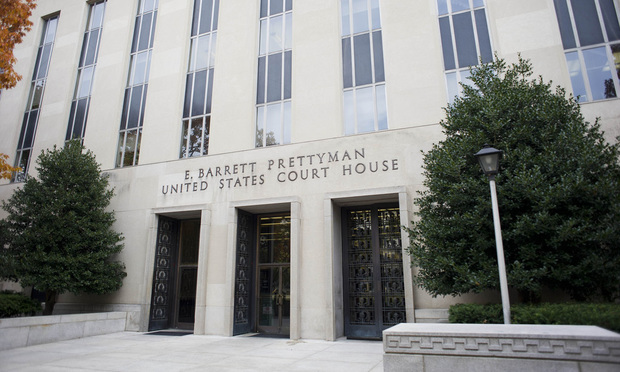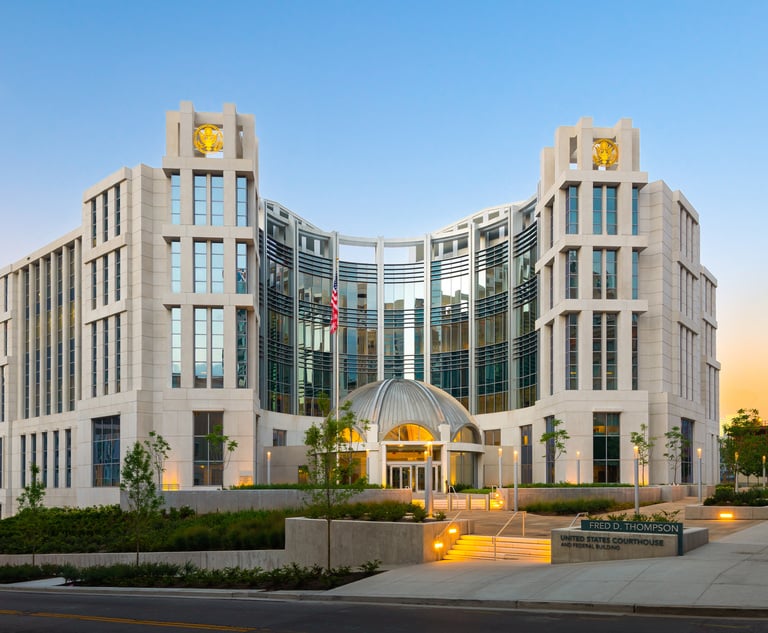Judiciary Prepares for Gradual Reopening During COVID-19, but Tells Courts to Heed Local Officials
Guidelines given to federal courts Monday lay out how they might gradually reopen after closing due to the COVID-19 pandemic.
April 27, 2020 at 07:32 PM
4 minute read
 E. Barrett Prettyman Court House in Washington, D.C. Photo: Diego M. Radzinschi/ALM.
E. Barrett Prettyman Court House in Washington, D.C. Photo: Diego M. Radzinschi/ALM.
Judiciary officials are telling federal courts to prepare for reopening after shuttering their doors during the COVID-19 pandemic, but to take their lead from local authorities as they gradually move to hold more in-person proceedings.
In guidelines provided to federal courts Monday, the Administrative Office of the U.S. Courts left it to each jurisdiction to determine how best to proceed in the reopening process, just as courts also made individual decisions to move to remote work as the pandemic spread across the country.
In a memo to judiciary staff announcing the guidelines, AO Director James Duff said while some courts are considering how to reopen, many "are not close to this process yet as the pandemic continues to have severe impact in their communities."
Duff said the judiciary would also be providing additional guidance in the future, including "details on resuming grand jury and petit jury proceedings, the potential of utilizing COVID-19 testing for employees and the public prior to entering the facilities, accommodating employees who must rely upon mass transportation, and the potential for requiring the use of face coverings and masks in the buildings."
"There are differing views about how to manage each of these challenging issues, and our task force is working on consensus, or at least options, for recommendations," Duff added.
He also said the judiciary's existing task force on COVID-19 created a subgroup of chief judges and court executives on restarting jury trial proceedings. "Issues such as testing potential jurors, social distancing considerations during jury assembly, voir dire, jury deliberations, and many others are being considered. Guidance on these issues will be forthcoming," Duff wrote.
The reopening process as laid out in the document includes four phases, with many courts currently in the first phase: courthouses are closed to the public, employees are teleworking but essential proceedings are moving forward. Phase four has courts at full functionality, after public health officials announce the virus is suppressed within the United States.
Phase two says on-site court proceedings can be increased and staff in court buildings "should continue to maximize physical distance from others," but vulnerable employees should still telework. Court officials are told to "make operational preparations for a significant increase in filings and other court proceedings (i.e., grand jury) that will likely occur during this phase; emphasis should be on accepting filings remotely to the greatest extent possible."
During phase three, most in-person, public proceedings can be held, but vulnerable individuals should keep a 6-foot distance from others. Large public spaces in courthouses can reopen, "but under limited 6-foot physical distancing protocols until CDC rescinds guidance and additional mitigation measures are approved government-wide."
Some of the factors courts are told to consider before starting the reopening process are whether the number of total daily COVID-19 diagnoses fall during a two-week period, if there are still local restrictions like stay-at-home orders, and if their courts have had confirmed or suspected cases of the virus within their own facilities.
Local court officials are also told to prepare for the possibility of returning to tighter restrictions "if conditions significantly worsen or there is a resurgence of local COVID-19 cases."
"Because each state and municipality is in a different posture in the fight against COVID-19, each circuit and district will have to make local decisions on operational status based on the jurisdiction's current COVID-19 case count and local stay-at-home and quarantine orders. This national guidance is designed to help facilitate decision-making at the local level," the guidelines read.
The majority of federal courts in the U.S. are currently holding remote proceedings, as the pandemic has forced the closure of courthouses to prevent the spread of the virus. Judges are holding remote proceedings like phone or videoconferences, as attorneys also work from home as their law firms close their doors to most employees.
Also in Monday's memo, Duff said the federal judiciary is finalizing a proposed legislative package for additional funds for the courts, to be considered in Congress' next COVID-19 relief package. The judiciary received $7.5 million from the CARES Act, signed into law last month.
"Staff are regularly briefing and answering questions from congressional staff on the judiciary's response to COVID-19 and the status of court operations," Duff wrote.
This content has been archived. It is available through our partners, LexisNexis® and Bloomberg Law.
To view this content, please continue to their sites.
Not a Lexis Subscriber?
Subscribe Now
Not a Bloomberg Law Subscriber?
Subscribe Now
NOT FOR REPRINT
© 2025 ALM Global, LLC, All Rights Reserved. Request academic re-use from www.copyright.com. All other uses, submit a request to [email protected]. For more information visit Asset & Logo Licensing.
You Might Like
View All
Lavish 'Lies' Led to Investors Being Fleeced in Nine-Figure International Crypto Scam
3 minute read
SEC Puts Beat Down on Ex-Wrestling CEO Vince McMahon for Not Reporting Settlements
3 minute read
DOJ Files Antitrust Suit to Block Amex GBT's Acquisition of Competitor
Trending Stories
- 1'It's Not Going to Be Pretty': PayPal, Capital One Face Novel Class Actions Over 'Poaching' Commissions Owed Influencers
- 211th Circuit Rejects Trump's Emergency Request as DOJ Prepares to Release Special Counsel's Final Report
- 3Supreme Court Takes Up Challenge to ACA Task Force
- 4'Tragedy of Unspeakable Proportions:' Could Edison, DWP, Face Lawsuits Over LA Wildfires?
- 5Meta Pulls Plug on DEI Programs
Who Got The Work
Michael G. Bongiorno, Andrew Scott Dulberg and Elizabeth E. Driscoll from Wilmer Cutler Pickering Hale and Dorr have stepped in to represent Symbotic Inc., an A.I.-enabled technology platform that focuses on increasing supply chain efficiency, and other defendants in a pending shareholder derivative lawsuit. The case, filed Oct. 2 in Massachusetts District Court by the Brown Law Firm on behalf of Stephen Austen, accuses certain officers and directors of misleading investors in regard to Symbotic's potential for margin growth by failing to disclose that the company was not equipped to timely deploy its systems or manage expenses through project delays. The case, assigned to U.S. District Judge Nathaniel M. Gorton, is 1:24-cv-12522, Austen v. Cohen et al.
Who Got The Work
Edmund Polubinski and Marie Killmond of Davis Polk & Wardwell have entered appearances for data platform software development company MongoDB and other defendants in a pending shareholder derivative lawsuit. The action, filed Oct. 7 in New York Southern District Court by the Brown Law Firm, accuses the company's directors and/or officers of falsely expressing confidence in the company’s restructuring of its sales incentive plan and downplaying the severity of decreases in its upfront commitments. The case is 1:24-cv-07594, Roy v. Ittycheria et al.
Who Got The Work
Amy O. Bruchs and Kurt F. Ellison of Michael Best & Friedrich have entered appearances for Epic Systems Corp. in a pending employment discrimination lawsuit. The suit was filed Sept. 7 in Wisconsin Western District Court by Levine Eisberner LLC and Siri & Glimstad on behalf of a project manager who claims that he was wrongfully terminated after applying for a religious exemption to the defendant's COVID-19 vaccine mandate. The case, assigned to U.S. Magistrate Judge Anita Marie Boor, is 3:24-cv-00630, Secker, Nathan v. Epic Systems Corporation.
Who Got The Work
David X. Sullivan, Thomas J. Finn and Gregory A. Hall from McCarter & English have entered appearances for Sunrun Installation Services in a pending civil rights lawsuit. The complaint was filed Sept. 4 in Connecticut District Court by attorney Robert M. Berke on behalf of former employee George Edward Steins, who was arrested and charged with employing an unregistered home improvement salesperson. The complaint alleges that had Sunrun informed the Connecticut Department of Consumer Protection that the plaintiff's employment had ended in 2017 and that he no longer held Sunrun's home improvement contractor license, he would not have been hit with charges, which were dismissed in May 2024. The case, assigned to U.S. District Judge Jeffrey A. Meyer, is 3:24-cv-01423, Steins v. Sunrun, Inc. et al.
Who Got The Work
Greenberg Traurig shareholder Joshua L. Raskin has entered an appearance for boohoo.com UK Ltd. in a pending patent infringement lawsuit. The suit, filed Sept. 3 in Texas Eastern District Court by Rozier Hardt McDonough on behalf of Alto Dynamics, asserts five patents related to an online shopping platform. The case, assigned to U.S. District Judge Rodney Gilstrap, is 2:24-cv-00719, Alto Dynamics, LLC v. boohoo.com UK Limited.
Featured Firms
Law Offices of Gary Martin Hays & Associates, P.C.
(470) 294-1674
Law Offices of Mark E. Salomone
(857) 444-6468
Smith & Hassler
(713) 739-1250











